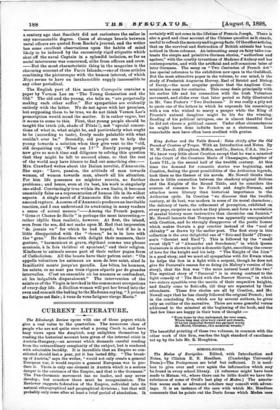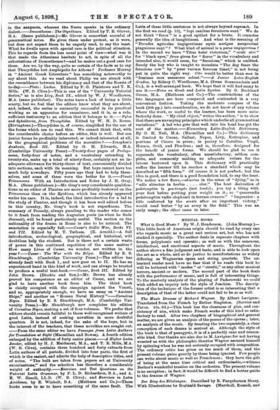SCHOOL-BOOKS.
The Medea of Euripides. Edited, with Introduction and Notes, by Clinton E. S. Headlam. (Cambridge University Press.)—The Prolegomena are brief but sufficient. It is need- less to give over and over again the information which may be found in every school library. (A reference might have been made to Metam. vii., where there can be little doubt we have the substance of some of Ovid'a last play of Medea.) The annota- tion seems such as advanced scholars may consult with advan- tage. It is an instance of the care with which Mr. Headlam comments that he points out the Doric forms which Medea uses in the anapests, whereas the Nurse speaks in the ordinary dialect.—Demosthenes: The Otynthiacs. Edited by T. R. Glover, MA. (Same publishers.)—Mr. Glover is somewhat scornful of grammatical notes. Be gives them under protest, as it were, but does not expect them to be eagerly read, to say the least. What he dwells upon with special care is the political situation. This he regards from the less usual point of view—what was it that made the Athenians hesitate to act, in spite of all the exhortations of Demosthenes ?—and he makes out a good ease for them. Are we, by the way, quite so certain of the facte as to say that Thucydides lost Amphipolis for Athens ? Professor Murray in "Ancient Greek Literature" has something noteworthy to say about this. As we read about Philip we are struck with the resemblance between his diplomacy and that of the Russia of to-day.—Plato: Laches. Edited by F. G. Plaistowe and T. R. Mills. (W. B. Clive.)—This is one of the "University Tutorial Series," as is also Livy, Book IX., edited by W. J. Woodhouse, M.A. (same publisher). The notes have a look of being a little scanty, but we feel that the editors know what they are about, and, indeed, the series is eminently successful in its practical working as an apparatus for examinees, and it is, as a rule, sufficient testimony t3 an edition that it belongs to it.—Pylos and Sphakteria, from Thucydides. Edited by W. H. D. Rouse. (Eivingtons.)—Thucydides is, of course, simplified for the use of the forms which are to read this. We cannot think that, with the considerable choice before an editor, this is well. But can junior forms be profitably interested, or indeed interested at all, in the geographical problems of the narrative P—Xenophon's Anabasis, Book III. Edited by G. M. Edwards, M.A. (Cambridge University Press).—Twenty-four pages of Prolego- mena, forty-four of notes, and a vocabulary extending to twenty-six, make up a total of ninety-four, certainly not an in- adequate allowance for thirty-three of text, conveniently divided into sections, each with its meaning. But boys cannot have too much help nowadays. Fifty years ago they had to help them- selves, and some of them were the better for it.—Plauti Trinummus. With an Introduction and Notes by J. H. Gray, M.A. (Same publishers.)—Mr. Gray's very considerable qualifica- tions as an editor of Plautus are more profitably bestowed on the Trinummus than on the Epidicus, which has already appeared under his care. It is, indeed, the ideal introduction for a lad to the study of Plantus, and though it has been well edited before in this country, Mr. Gray's book is not superfluous. The summary of Prosody, always puzzling to the reader who comes to it fresh from reading the Augustan poets (as when he finds abscessit), will be found particularly useful. The section on the nationality of the drama in Rome is also to be noticed. The annotation is especially full.—Cmsar's Gallic War, Books VI. and VII. Edited by M. T. Tatham. (E. Arnold.)—A full introduction, archwological, geographical, and historical, will doubtless help the student. But is there not a certain waste of power in this continued repetition of the same matter ? How many Lives of Csar, we wonder, are written in the year P—Cmsar : The War with the Belgw. Edited by E. S. Shuckburgh. (Cambridge University Press.)—The editor has already dealt with Book I., and now goes on to II. He has an experienced hand in this kind of work, and can always be trusted to produce a useful text-book.—Carar, Book III. Edited by John Brown. (Mackie and Son.)—Mr. Brown has already proved his competence as an editor of Ctesar, and we are glad to have another book from him. The third book is chiefly occupied with the campaign against the Veneti, and so, appropriately enough, we have an essay on "Ancient Ships," and another on "Roman Naval History."—Cornelius Nepos. Edited by E. S. Shuckburgh, M.A. (Cambridge Uni- versity Press.)—Mr. Shuckburgh now completes his edition of Cornelius Nepos, making a set of four volumes. We prefer that editors should remain faithful to these well-recognised writers of good Latin, instead of seeking novelties in more doubtful quarters. It is not, indeed, for the sake of the boys, but in the interest of the teachers, that these novelties are sought out. —From the mime editor we have Passages from Latin Authors for Translation at Sight (Macmillan and Bowes). A fourth edition enlarged by the addition of forty easier pieces.—A Higher Latin Reader, edited by H. J. lffaidment, M.A., and T. R Mills, M.A. (W. B. Clive), contains three hundred and forty extracts from Latin authors of all periods, divided into four parts, the first of which is the easiest, and admits the help of descriptive titles, and of notes. "The bulk are taken from papers set at University examinations," and the selection has therefore a considerable weight of authority.—Ezereises and Test Questions on the Tutorial Latin Grammar, by F. L. D. Richardson, B.A., and A. E. W. Hazen, LL.D. (W. B. Clive) ; and Exercises in Latin Accidence, by E. Winbolt, B.A. (Methuen and Co.)—These books seem to us to have something of the same fault. The Latin of these little sentences is not always beyond reproach. In the first we read (p. 19), " lupi canibus ferociores aunt." We do not think " ferox " is a good epithet for a brute. It connotes generally the idea of haughtiness. And what is the meaning of " Pecudes agricolae impigerrimae equis aurigae pauperrimi pinguiores stint " ? What kind of animal is a pecus impigerrima ? In the second we have "Titus habet victoriam," " ocuJi atri " for "black eyes," ferox given for "fierce" in the vocabulary and intended also, it would seem, for "ferocious," which is omitted. Surely the boy who is taught to translate "The dog fears the ferocious row" by " puer vaocam ferocem timet," is not being put in quite the right way. Cito would be better than mos in "feminae mox senescere solent."—A Junior Latin-English Gradus, by Sidney C. Woodhouse, M.A. (Swan Sonnenschein and Co.), is a well-arranged book. We hope that it will find many to use it.—Notes on Greek and Latin Syntax. By G. Buckland Green, M.A. (Methuen and Co.)—The constructions of the two languages are here compared and contrasted in a very convenient fashion. Taking the moderate compass of the book (203 pp.) into consideration, we do not know of any volume where the work, so useful to the learner, has been more satis- factorily done. "My chief object," writes the author, "is to show that there are unvarying principles which underlie all grammatical variations." A lad who gets that well into his head has got the root of the matter.—Elementary Latin-English Dictionary. By G. H. Nall, M.A. (Macmillan and Co.)—This dictionary is limited to Ctesar, Sallust, Nepos, Livy, Eutropius, and portions of Cicero in prose ; in poetry to Catullus, Horace, Ovid, and Plawdrus ; and is, therefore, designed for the benefit of junior forms. We should be glad to see it supersede the vocabulary, often unsatisfactory, seldom com- plete, and commonly making no adequate return for the labour bestowed upon it. This dictionary will practically suffice the learner till he reaches a standard which may be described as "fifth form." Of course it is not perfect ; but the idea is good, and there is a good foundation laid, to say the least. We notice a few flaws,—abiectus in the sense of "dying," as in " udis abiectus in herbis . . . . olor." The best derivation of pedetemptim is pes-tempto (not tendo) ; you try a thing with your foot before putting your weight on it ; so " quaerendis pedetemptim vadis elephanti in terram evasere." " Imperator : a title conferred by the senate after an important victory," would read better "by an army in the field." This was an early usage ; the other came in later.



































 Previous page
Previous page